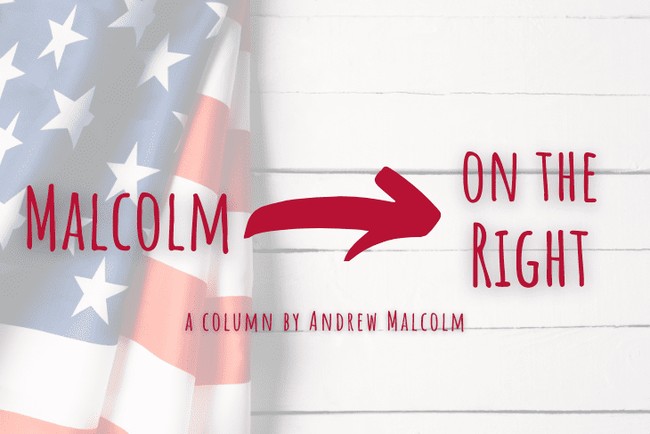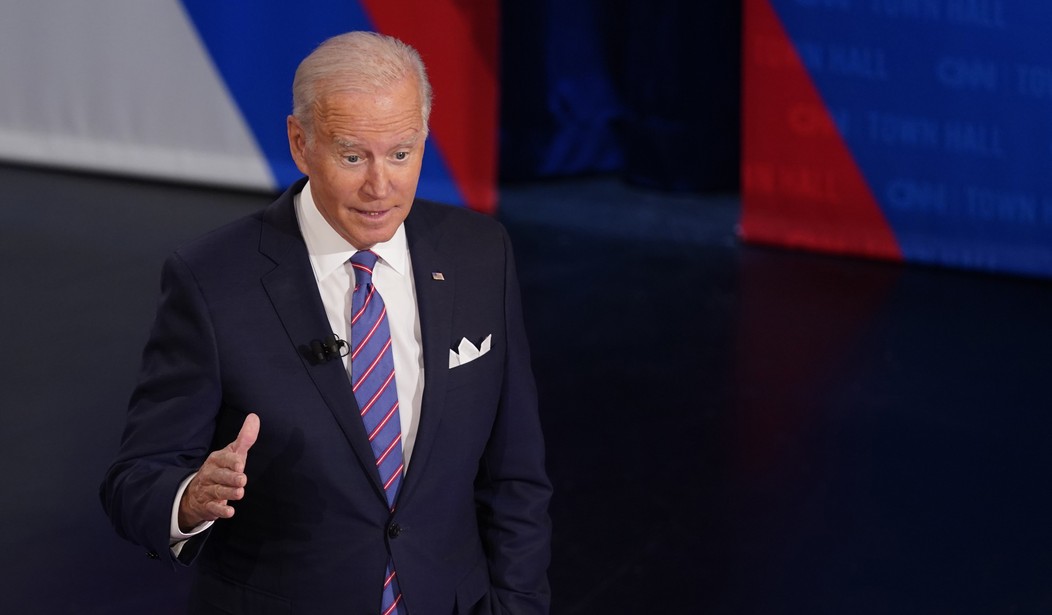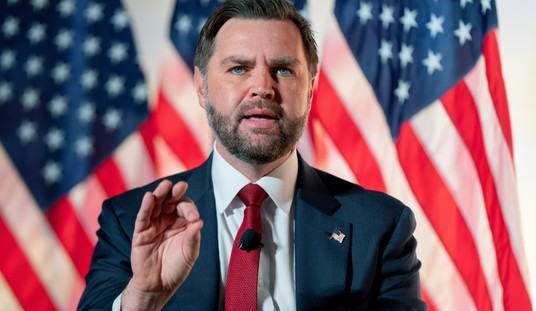As often seems to happen, Joe Biden lost his train of thought the other night.
He was on international TV, trying to explain why the supply-chain crisis is another one of our serious national problems that are not his fault. He got the Port of Los Angeles part down all right, but couldn’t remember the other, huge California port. Then he asked, “What am I doing here?”
Helpful Anderson Cooper of helpful CNN helped him out with “Long Beach,” which the leader of the free world recognized right away as the Democratic city he was trying to recall.
It now seems that Americans themselves, however, are no longer helping Joe Biden out by propping him up in vain hopes that he was the right choice over his loud predecessor.
Biden’s poll numbers are tanking.
Surveys provide a variety of results, depending on poll samples, adjustments, phrasing bias, averages, and so on. But they are all down, way down, from well above 50 percent approval at the start of his endless, young presidency, now deep into the 30’s at worst.
Here’s the standard caveat: Polls are only snapshots of a moment in time. They can be misleading; Ask Hillary Clinton. They are not predictive; Ask her that, too.
Especially misleading 52 weeks out from midterm elections that millions now hope will cripple the legislative dreams of the progressives and socialists, who are pulling the strings on this president and telling him what to do.
An incumbent president’s name is on no midterm election ballots. But the balloting after his first two White House years has become an interim verdict on that presidency. And 19 of the last 21 midterm verdicts have hurt that president’s party.
In 2010, Barack Obama’s Democrats got bushwhacked by angry Americans, losing an historic 63 House seats, six Senate seats and nearly 1,000 state and local elections, devastation they have yet to fully recover from.
But Republicans should not get too excited now about Nov. 8, 2022. Remember George W. Bush’s first midterm elections in 2002? Could have been grim for him, as it was for Bill Clinton in 1994. But then 9/11 happened, and Bush’s leadership performance vaulted approval up to 92 percent. Republicans gained two Senate seats and eight House seats.
Current Senate membership is 50:50, with Biden’s border czar Kamala Harris casting any tiebreaker. Nancy Pelosi’s abrasive House control is based on three Democrat seats that could evaporate before polls close that night.
Looming retirements threaten safe Dem seats. Plus last year’s Census forces redrawing of congressional districts. Heavily Democratic northern states lost seats. Mostly conservative, Sun Belt states gained seats. State legislatures that largely design and approve the new districts are heavily GOP (See 2010 Obama midterm devastation above).
Reading polls as predictive this far in advance of a midterm is ridiculous. Prayerfully, no new 9/11 horror awaits this time. But polling this far in advance of voter verdicts does still remain very revealing and important.
For one thing, it sets a media coverage agenda of expected Democratic losses, possibly severe ones, which can become self-fulfilling. It creates the narrative, too, for the ensuing presidential election.

The emerging weaknesses of Jimmy Carter were confirmed in his one and only midterm election. Republicans picked up three senators and 14 House members in 1978, most of them conservatives who augured Ronald Reagan’s support and approaching agenda two years later.
Advance polling now can adversely affect fundraising for the incumbent party and vice versa for the challengers. Especially now that so many once-local races easily become nationalized and tied to larger issues that do not directly affect the district.
Poor polling a year out also affects candidate recruiting. Nancy Pelosi likes to claim credit for Democrats’ big successes in 2006. It was actually Rep. Rahm Emanuel.
In the 1980s, an ambitious Emanuel would occasionally stop by my news bureau office in Chicago, hoping to trade juicy, inside city, political gossip for a free lunch. It often worked.
Soon after, he became Bill Clinton’s 1992 campaign finance chair in 1992 and later, political director. He returned to join the Chicago Democrat machine and inherit Rod Blagojevich’s House seat when he became Illinois governor.
In 2009, the savvy Emanuel would become Obama’s White House chief of staff, then Chicago mayor, and now, Biden’s nominee as ambassador to Japan.
In 2006, Bush was bogged down over discontent with the stalled Iraq War, his handling of Hurricane Katrina, and the start of serious economic troubles that would scuttle John McCain’s presidential candidacy two years later.
Emanuel went after atypical Democrat candidates — veterans, business people, non-politicians. That worked, too. His party captured six new Senate seats, six new governorships, and 31 House seats, making Pelosi the first female Speaker. With Emanuel gone by 2010, she was unseated as leader in that midterm disaster.
As successful fundraisers like her predictably do, Pelosi will inevitably predict a huge 2022 election victory for her party. At the moment, polls indicate that is unlikely.
Democrats will attempt to wave the banner of a dangerous Trump resurgence next year, especially if he unwisely announces his 2024 candidacy before then. That fear seems unlikely to have much oomph for Democrats. Trump’s offstage now, and all eyes are on Biden.
With No. 45 gone since Jan. 20, No. 46 has squandered his majority job approval. Gallup, for one, now puts Biden hovering in the low 40s, down 14 points since June and six just since last month.
Others have him deep in the 30’s and underwater in most specific policy areas. Two new polls showed Biden holding on to 80 percent approval among Democrats. But a few months ago, it was closer to the mid-90s.
Independents are peeling off. They’re the ones who swung toward Biden last November. Obama, both Bushes, Clinton, Reagan and even Jimmy Carter were all well above 50 percent at this point in their first year.
A Fox News poll reported Americans are worried about inflation (nearly 90 percent), grocery prices higher than under Trump (83 percent), slower delivery times (55 percent), and empty store shelves (71 percent). Two out of three (67 percent) see surging gas prices as a major problem.
Collectively, Biden’s strange behaviors have understandably weakened public confidence. Inexplicably, he sometimes shouts in speeches, sometimes whispers, routinely mispronounces names of alleged close friends written on a printed sheet. Last week at an outdoor White House ceremony, without introduction, the president stepped to the podium and began speaking while loud trumpet music played on. Wife Jill came and quietly led him away.
He often forgets the names of people standing right next to him or sharing a video conference with. He continues to repeat long-debunked, fabricated stories, even claiming an early, fictitious career driving 18-wheelers.
This has combined with serious policy failures to weaken support. The bloody, botched troop withdrawal and civilian evacuation from Afghanistan are often blamed for poll damage. And they did.
But his poll drop actually began almost two weeks before, in early August, as the rampant seriousness of the Delta variant and soaring infection numbers destroyed Biden’s rosy claims about the vaccines’ effectiveness.
Biden’s handling of the pandemic, largely with the rapidly-developed vaccines Trump ordered, had been his strongest leg of support. But his draconian vaccine mandate orders for companies drew significant resistance from individuals and, when their workers refused to go along, from some employers, making Biden look even more feckless.
Biden had assured the country that the disturbing increase in inflation, year-over-year, from his multi-trillion-dollar spending packages was a brief blip. But it has continued. Most notably at the closely watched gas pump.
The average price of gas nationally when Biden took the oath was $2.38. This month it soared to $7.59 a gallon in some California towns. Again looking helpless, the president claimed, “I have no near-term answer.” That sounded like President Carter, but was President Biden.
Biden appealed to OPEC to boost production and was rejected. So, in less than a year after Biden killed the Keystone Pipeline and shut down oil drilling leases, the United States went from energy independence under Donald Trump to begging OPEC for more oil.
Last week, a smug Biden hailed train travel and reveled in saying his transportation and energy plans promised to “take millions of automobiles off the road, off the road.” That doesn’t seem like a politically savvy plan for a stable president to promise Americans.
Then there is the southern border, which has long been a festering, humanitarian mess but was quieted under Trump’s tough, stay-in-Mexico orders. Biden’s loose talk, inattention, and restricted enforcement resulted within months in hundreds of thousands of illegal immigrants streaming, unchecked, across the border — and without masks, no less.
Government buses and planes ferried thousands deep into the U.S. to cities where any future enforcement actions seemed unlikely and impractical, suggesting this was no accident.
None of these problems or their underlying causes are subject to short-term fixes, nor is widespread voter dissatisfaction with them and with ineffective government action.
Which brings us to Nov.8, 2022. And the winners are….











